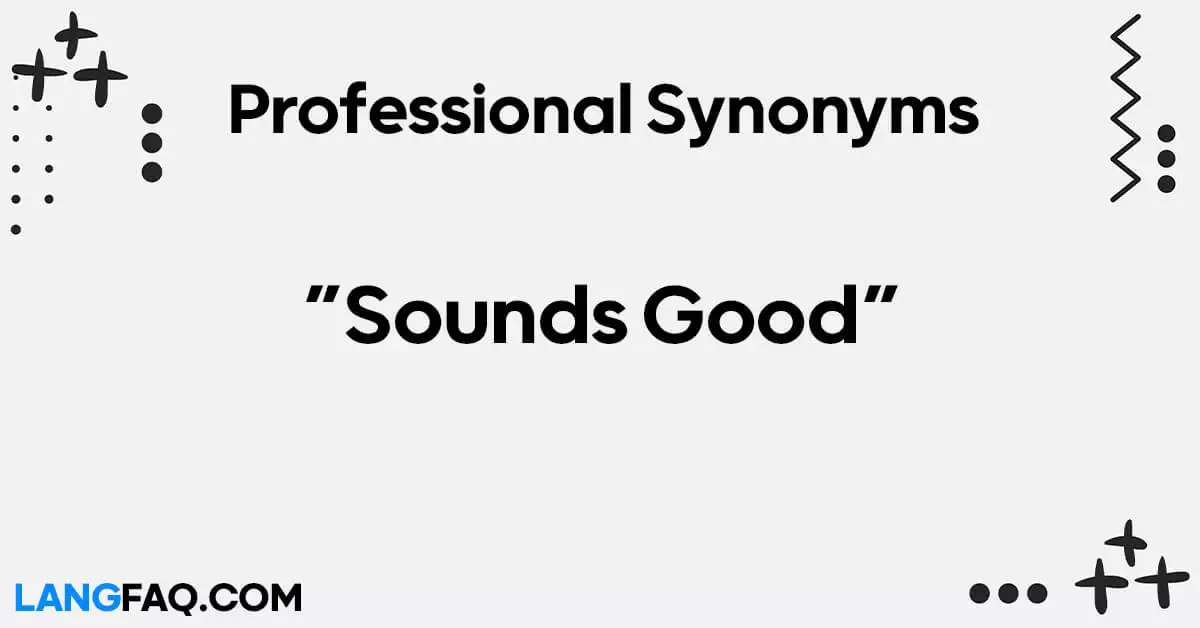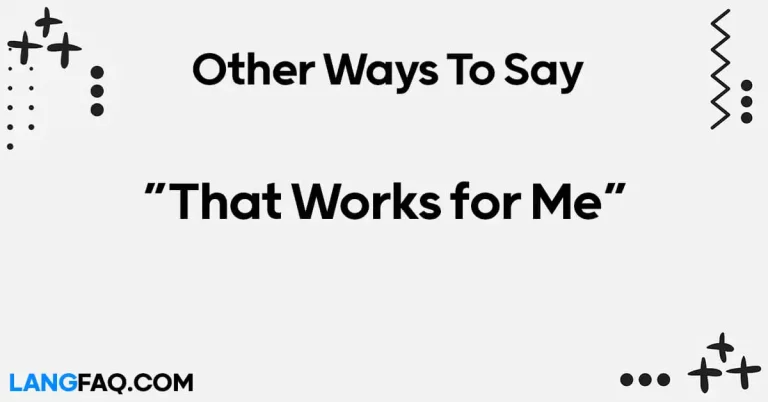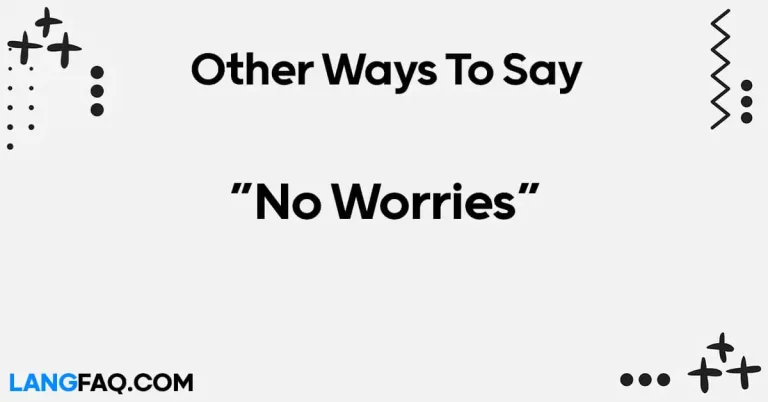“Sounds good” is a commonly used phrase that is often used to express agreement or approval. It can also be used to indicate that something is pleasant or pleasant-sounding.
While it may seem like a harmless phrase, it can come across as unprofessional in certain situations.
In a professional setting, it is important to use language that conveys a more sophisticated and polished tone. This includes finding alternative ways to say “sounds good” that are more appropriate for professional communication.
Not only does this help to elevate your language, but it also shows a higher level of respect and thoughtfulness towards the person you are communicating with.
Here are 26 professional synonyms for “sounds good” that you can use in your professional communication:
- Understood.
- Certainly.
- Affirmative.
- Agreed.
- Accepted.
- Approved.
- Absolutely.
- Confirmed.
- You have my consent.
- That’s acceptable.
- That works.
- I concur.
- Very well.
- I’m on board.
- I’m in agreement.
- Okay.
- Roger that.
- I’m supportive.
- No objections.
- I endorse that.
- It’s a deal.
- You’ve got my approval.
- Count me in.
- I’m on the same page.
- All right.
- I’m in favor of that.
These phrases can be used in a professional context to show agreement or approval in a polite and formal manner.
By incorporating these synonyms into your language, you can improve the tone and professionalism of your communication. It also shows that you have a diverse vocabulary and are able to express yourself in a more sophisticated manner.
So, the next time you are tempted to say “sounds good,” consider using one of these alternatives instead.
Key Takeaways:
- Choose professional synonyms for “sounds good” to sound more competent and polished in your communication.
- Using professional synonyms for “sounds good” can help convey a positive and enthusiastic response in a more professional manner.
- In business communication, using synonyms like “favorable” or “encouraging” instead of “sounds good” can help convey a more confident and assured tone.
What Does “Sounds Good” Mean?
“Sounds good” is a casual phrase often used in conversation to express agreement or approval. It conveys a positive response to a suggestion, plan, or idea. It is an informal way of saying that something is acceptable, agreeable, or pleasing.
When someone says “sounds good,” they are indicating that they understand and are comfortable with the proposal or situation. It is a versatile phrase that can be used in various contexts, such as making plans with friends, discussing work projects, or responding to invitations.
Essentially, “sounds good” is a way of expressing approval or agreement without providing further explanation.
Is It Professional to Say “Sounds Good”?
Using the phrase “Sounds Good” in a professional context is generally acceptable, but it may not always be the most sophisticated or formal way to express agreement or approval. It’s important to consider the tone and formality of your communication when choosing your words.
In professional settings, especially during formal written communication, meetings, or presentations, using more refined and varied expressions can enhance your professionalism. This is where incorporating professional synonyms for “Sounds Good,” as discussed in the article, can be beneficial. These synonyms can help you convey agreement, approval, or positivity in a more sophisticated and polished manner.
However, in casual conversations or emails with colleagues, “Sounds Good” is perfectly fine and widely used. The key is to adapt your language to the context and audience to ensure effective communication while maintaining professionalism when necessary.
Why Use Professional Synonyms for “Sounds Good”?
Incorporating professional synonyms for “Sounds Good” can elevate your communication skills and project a more sophisticated and professional image. It adds diversity to your lexicon and helps avoid repetitive language.
Moreover, utilizing synonyms demonstrates mastery of the English language and showcases a wide range of expressions at your disposal. This can leave a positive impression on others, particularly in professional environments.
So, why opt for professional synonyms for “Sounds Good”? Because it heightens your language, showcases your linguistic proficiency, and enhances overall communication effectiveness.
Pro-tip: Enhance your vocabulary by regularly learning and utilizing new synonyms.
What Are Some Professional Synonyms for “Sounds Good”?
When communicating in a professional setting, it’s important to use language that reflects competence and confidence. One phrase that is commonly used, but may not convey a strong message, is “sounds good”.
In this section, we will explore professional synonyms for “sounds good” that can elevate the tone of your communication and effectively convey a positive response. From agreeable to satisfying, we will discuss fifteen different ways to express approval in a professional manner.
1. Agreeable
Selecting the right professional synonym for “Sounds Good” can enhance your communication and leave a positive impression. Here are the steps to effectively use the term “Agreeable”:
- Context: Understand the context of the conversation to determine when to use the synonym.
- Choose the synonym: Select a suitable synonym such as “Acceptable” or “Pleasing” based on the tone and formality of the communication.
- Use confidently: Incorporate the synonym naturally into your response, showing professionalism and understanding.
- Pro-tip: Use synonyms sparingly and strategically to avoid sounding repetitive or insincere.
2. Satisfactory
To ensure clear communication, it is important to use professional synonyms for “sounds good” in business settings. These alternatives convey a higher level of professionalism and competence. Some professional synonyms for “sounds good” include:
- “satisfactory”
- “acceptable”
- “pleasing”
- “favorable”
By using these synonyms, you can enhance your business emails, text messages, and meeting setups. For example, instead of saying “sounds good,” you can say “that is satisfactory” or “that is acceptable.”
Incorporating these professional synonyms in your communication will help you convey your professionalism and establish a positive impression in business interactions.
3. Acceptable
When choosing professional synonyms for “Sounds Good,” one option is “Acceptable.” Follow these steps to effectively incorporate it into your communication:
- Select the appropriate context to use “Acceptable” in your message.
- Ensure clarity by using the term in a sentence that clearly conveys your understanding or agreement.
- Consider the tone and formality of your communication to determine if “Acceptable” is the most suitable synonym.
- Review your message to ensure that “Acceptable” accurately reflects your intended meaning and aligns with the overall tone and purpose of your communication.
The term “acceptable” originated from the Latin word “acceptabilis,” meaning “worthy of acceptance.” It has been in use in the English language since the 14th century to describe something that meets a standard, requirement, or expectation.
Over time, it has become an important term in professional communication, allowing individuals to express agreement or approval in a more formal and nuanced manner.
4. Pleasing
When communicating in a professional setting, it is important to use synonyms for “sounds good” that convey a more sophisticated tone. Here are some professional synonyms:
- Agreeable
- Satisfactory
- Acceptable
- Pleasing
- Favorable
- Encouraging
- Promising
- Commendable
- Appealing
- Encouraging
- Gratifying
- Positive
- Admirable
- Desirable
- Satisfying
Using these synonyms in various business communication channels, such as emails, meetings, and text messages, can enhance professionalism and convey a more polished image.
In a recent business email exchange, instead of saying “sounds good,” I used the synonym “pleasing” to acknowledge a colleague’s proposal. This small change in wording helped establish a more professional and respectful tone, ultimately strengthening our working relationship.
5. Favorable
When utilizing professional synonyms such as “favorable” in business emails, it is crucial to clearly and professionally convey a positive response. To do so, follow these steps:
- Select the appropriate synonym for the given situation.
- Begin the email with a polite greeting.
- Acknowledge the information or request.
- Use the chosen synonym to express agreement or satisfaction.
- Include any additional details or suggestions, if necessary.
- Conclude the email with a courteous closing.
By incorporating professional synonyms like “favorable,” you can improve your communication skills and project a more professional image in your business emails.
6. Encouraging
When utilizing professional synonyms for “Sounds Good”, the term “encouraging” can serve as a valuable alternative to convey positivity and support. Here are some steps to effectively incorporate this synonym into your communication:
- Choose the appropriate context to use the synonym “encouraging” in your message.
- Ensure that your tone and language align with the intended meaning.
- Utilize “encouraging” to express enthusiasm, approval, or optimism towards a proposal, idea, or plan.
- Consider incorporating phrases such as “That’s very encouraging,” or “I find this idea to be quite encouraging.”
- Remember to maintain professionalism and sincerity when utilizing this synonym.
By incorporating the term “encouraging” into your communication, you can effectively convey a positive and supportive attitude while maintaining a professional tone.
7. Promising
When using the professional synonym “promising” in business communication, follow these steps:
- Context: Understand the situation and ensure that the use of “promising” accurately reflects the content or proposal being discussed.
- Tone: Ensure that the tone of the message aligns with the positive connotations of “promising” and conveys optimism.
- Clarity: Clearly convey why the situation or idea is considered promising, providing specific details or evidence to support your statement.
- Brevity: Keep the message concise while still conveying the sense of promise or potential.
- Follow-up: If appropriate, indicate what actions or next steps will be taken to further explore or capitalize on the promising opportunity.
8. Commendable
“Commendable” is a professional synonym for “sounds good” that conveys a sense of approval or praise. It implies that something is deserving of commendation or recognition. This term is frequently utilized in business settings to express satisfaction or agreement with a proposal, idea, or achievement.
For instance, a manager might say, “Your efforts to improve efficiency are commendable.” This acknowledges and appreciates the hard work and positive outcomes.
In summary, substituting “commendable” for “sounds good” adds a level of professionalism and recognizes excellence.
Fact: Studies have demonstrated that using positive language in business communication can enhance collaboration and productivity.
9. Appealing
To add more professionalism and diversity to your communication, consider using synonyms for “sounds good” such as “appealing.” Here are steps to effectively incorporate this alternative word into your language:
- Recognize the importance of using variety in your language.
- Understand the meaning and connotation of “appealing,” which implies attractiveness and positive qualities.
- Identify suitable contexts and situations to use “appealing,” such as when expressing approval, agreement, or satisfaction.
- Practice incorporating “appealing” into your written and verbal communication.
- Use it confidently and appropriately, considering the tone and formality of each interaction.
10. Encouraging
- Use “encouraging” as a professional synonym for “sounds good” in your communication.
- Introduce phrases like “that’s encouraging” or “I find that encouraging” to express positivity and support.
- Utilize “encouraging” to convey enthusiasm and motivation when discussing ideas, proposals, or progress.
- In business emails, use “encouraging” to indicate that you are receptive to suggestions or willing to move forward with a plan.
- In text messages, respond with “encouraging” to show agreement, approval, or excitement.
- Remember to use “encouraging” appropriately in different contexts to maintain professionalism and convey a positive tone.
11. Gratifying
Gratifying responses in a professional context can help enhance communication and build positive relationships. Here’s how to use professional synonyms for “Sounds Good” in your business interactions:
- Choose the right synonym based on the tone and level of formality required.
- Use phrases like “That is pleasing to hear” or “That is acceptable to us” to express approval.
- When confirming plans, say “That is favorable” or “That is encouraging” to show enthusiasm.
- For business meetings, respond with “That is a commendable idea” or “That is a desirable solution.”
- In text messages, use phrases like “That is satisfying” or “That is gratifying.”
Pro-tip: Vary your language to keep your responses fresh and maintain a professional image.
12. Positive
Using professional synonyms for “Sounds Good” can enhance your communication and convey a more positive and professional tone. Here are some steps to effectively use professional synonyms in your conversations:
- Choose the appropriate synonym from the list, such as “agreeable,” “satisfactory,” or “encouraging.”
- Consider the context and tone of your message.
- Replace “Sounds Good” with the selected synonym to express positivity and enthusiasm.
- Ensure that the synonym aligns with the intended meaning of your message.
- Proofread your message to ensure clarity and coherence.
- Use the selected synonym consistently throughout the conversation to maintain a professional and positive impression.
13. Admirable
To incorporate the sub-topic “13. Admirable” and create a list of steps, one could discuss how to demonstrate admirable qualities in a professional setting:
- Show integrity and honesty in all your interactions.
- Take responsibility for your actions and hold yourself accountable.
- Display a strong work ethic by consistently putting in your best effort.
- Be proactive and take initiative to solve problems or improve processes.
- Practice effective communication skills, including active listening and clear articulation.
- Collaborate and work well with others, fostering a positive and inclusive environment.
- Continuously seek opportunities to learn and grow, demonstrating a growth mindset.
- Show empathy and respect towards colleagues and clients.
- Exhibit resilience and perseverance in the face of challenges.
- Embrace diversity and inclusivity, valuing different perspectives and ideas.
Pro-tip: When demonstrating admirable qualities, remember that actions speak louder than words. Consistently practicing these behaviors will help you build a reputation as a trusted and respected professional.
14. Desirable
“Desirable” is a professional synonym for “sounds good” that can be used in various business contexts to convey approval or agreement. Here are some steps on how to effectively use this synonym:
- Consider the context and audience to ensure appropriateness.
- Use “desirable” to express approval or agreement in a polite and professional manner.
- Ensure that the tone and language of your message align with the desired impression.
- Use variations of “desirable” to add variety and avoid repetition.
- Be mindful of the overall tone and formality of your communication.
By incorporating “desirable” into your business communication, you can convey a positive and professional impression while expressing agreement or approval.
15. Satisfying
Choosing synonyms for the phrase “sounds good” can add variety and professionalism to your communication. Here are some steps to incorporate the synonym “satisfying” effectively:
- Assess the context: Determine if “satisfying” is suitable based on the tone and formality of the conversation.
- Consider the audience: Ensure that the synonym aligns with the intended message and resonates with the recipient.
- Choose the right moment: Select opportunities where using “satisfying” enhances the conversation, such as acknowledging a job well done or expressing agreement.
- Use it naturally: Integrate “satisfying” seamlessly into your sentences, ensuring it maintains a positive and encouraging tone.
- Monitor reactions: Observe how your audience responds to the use of “satisfying” and adjust accordingly for future communication.
Sample Email Exchange Using Professional Synonyms for “Sounds Good”
In a professional setting, it’s important to utilize appropriate language to respond positively to emails. Here is a sample email exchange incorporating professional synonyms for “Sounds good”:
Email 1:
Subject: Follow-up Meeting
Dear [Name],
Thank you for proposing a follow-up meeting. I am thrilled to accept your offer.
Email 2:
Subject: Re: Follow-up Meeting
Dear [Name],
Thank you for agreeing to the meeting. I wholeheartedly concur and eagerly anticipate discussing the details further.
Suggested alternatives to “Sounds good” include “Thrilled to,” “Wholeheartedly concur,” and “Eagerly anticipate.” These phrases convey a positive and professional tone in email exchanges.
Using Professional Synonyms for “Sounds Good” in Business Emails
Incorporating professional synonyms for “sounds good” in business emails can improve your communication skills and portray you as more professional and articulate. Instead of repeatedly using the same phrase, consider including these alternatives:
- “Understood” – A concise and clear way to acknowledge agreement or acceptance.
- “Noted” – Indicates that you have taken note of the information and will act accordingly.
- “Agreed” – Signifies your agreement or approval with the proposal or suggestion.
- “Accepted” – Shows your acceptance of a request or offer.
- “Approved” – Indicates your approval of a plan, idea, or proposal.
By utilizing these professional synonyms, you can add variety and professionalism to your business emails, leaving a positive impression on your recipients. Experiment with different alternatives to find the ones that best fit your communication style.
How to Use Professional Synonyms for “Sounds Good” in Setting Up Business Meetings
Setting up business meetings requires utilizing professional synonyms for “sounds good” to convey agreement or approval in a more professional manner. Here are some steps to follow:
- Choose the right synonym: Find alternative phrases like “That works for me”, “I agree”, or “I’m on board” to express agreement in a professional manner.
- Consider the context: Select synonyms that are appropriate for the formal nature of a business meeting and match the tone and level of formality.
- Practice and fluency: Familiarize yourself with the selected synonyms to ensure smooth and confident communication during the meeting.
- Listen actively: Pay attention to the opinions of others and use appropriate professional synonyms to acknowledge their ideas and contributions.
- Adapt to cultural differences: Take into consideration cultural norms and expectations when using professional synonyms in international or diverse business settings.
Implementing these steps will help you enhance professionalism and promote effective communication in business meetings.
How to Confirm Multiple Plans Using Professional Synonyms for “Sounds Good”
To confirm multiple plans using professional synonyms for “Sounds good,” follow these steps:
- Express agreement: Use phrases like “That works for me,” “I’m on board,” or “I’m in.”
- Show enthusiasm: Respond with phrases such as “I’m excited about it,” “Count me in,” or “I’m looking forward to it.”
- Offer affirmation: Say “Absolutely” or “Definitely” to confirm your agreement.
- Suggest alternatives: If the plan doesn’t work, propose alternatives politely, like “How about we try this instead?” or “Let’s explore other options.”
Remember, these professional synonyms can help you convey your confirmation in a more polished and enthusiastic manner.
How to Use Professional Synonyms for “Sounds Good” in Text Messages
To utilize professional synonyms for “Sounds good” in text messages, follow these steps:
- Consider the context and tone of the conversation.
- Choose an appropriate synonym based on the formality of the discussion.
- Use phrases like “Understood,” “Agreed,” or “I’m on board” for a more professional tone.
- Employ phrases such as “Certainly,” “Certainly, let’s proceed,” or “That works for me” to express agreement.
- Experiment with different synonyms to enhance your communication skills.
- Remember to tailor your response to the specific situation.
Frequently Asked Questions
What are some professional synonyms for “sounds good”?
Some professional synonyms for “sounds good” include “that works well,” “that’s all okay,” and “I can work with that.”
Can I use these alternatives in both spoken and written situations?
Yes, these alternatives can be used in both spoken and written communication.
Is “sounds good” considered a formal or informal phrase?
“Sounds good” is considered informal, but it can still be used in professional conversations or business emails.
Why is it important to use better phrases than “sounds good” in formal settings?
Using more professional phrases shows attention to detail and can make a person sound more confident and assertive in their agreements.
What is a good way to confirm multiple plans and show agreement with all aspects of the plan?
“That’s all okay” is a good phrase to use in these situations.
Can you provide some examples of professional alternatives to “sounds good”?
Some examples include “that works well for me,” “I agree with that,” and “I’m on board with that.”







